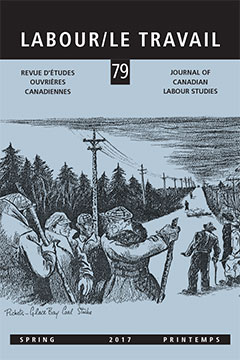Published 2017-05-11
How to Cite
Abstract
The paper examines the experience of C.B. Wade (1906–1982), a chartered accountant and university instructor who was recruited to work for organized labour during the period of transition from wartime mobilization to postwar reconstruction at the end of the Second World War. In hiring Wade in 1944, District 26 of the United Mine Workers of America became one of the first Canadian unions to employ a research director to help address the challenges of the new age of industrial legality and advance their social democratic agenda. The paper discusses Wade’s background, including his involvement in the Workers’ Educational Association, and documents his contributions to the work of the coal miners’ union, including the efforts to promote public ownership of the industry. In addition, the paper discusses Wade’s unpublished history of the union, a manuscript that has had a long life as an underground classic. While the negotiation of the postwar compromises between labour, capital and the state gave union staff such as Wade an increasingly central role in labour relations, this was not a stable context, and the paper also considers the deepening Cold War conditions that led to the end of his employment in 1950. In the context of labour and working-class history, Wade can be associated with a relatively small cohort of politically engaged intellectuals who made lasting contributions to the research capacity of unions and to the field of labour studies.
L’article examine l’expérience de C.B. Wade (1906-1982), comptable agréé et professeur d’université qui a été recruté pour travailler pour le mouvement ouvrier organisé pendant la période de transition de la mobilisation de guerre à la reconstruction d’après-guerre à la fin de la Seconde Guerre mondiale. En embauchant Wade en 1944, le district 26 des United Mine Workers of America est devenu l’un des premiers syndicats canadiens à employer un directeur de recherche pour relever les défis de la nouvelle ère de la légalité industrielle et promouvoir leur programme social-démocrate. L’article discute les antécédents de Wade, y compris sa participation à l’Association pour l’éducation des travailleurs, et souligne ses contributions aux travaux du syndicat des mineurs du charbon, y compris les efforts visant à promouvoir la nationalisation de l’industrie. En outre, l’article discute l’histoire inédite de Wade du syndicat, un manuscrit qui a eu une longue vie comme un classique souterrain. Tandis que la négociation des compromis d’après-guerre entre le travail, le capital et l’État a donné au personnel de syndicat comme Wade un rôle central croissant dans les relations de travail, ce n’était pas un contexte stable, et l’article considère également l’approfondissement de la guerre froide qui a mené à la fin de son emploi en 1950. Dans le contexte de l’histoire du travail et de la classe ouvrière, Wade peut être associé à une cohorte relativement restreinte d’intellectuels politiquement engagés qui ont apporté une contribution durable à la capacité de recherche des syndicats et au domaine des études du travail.
